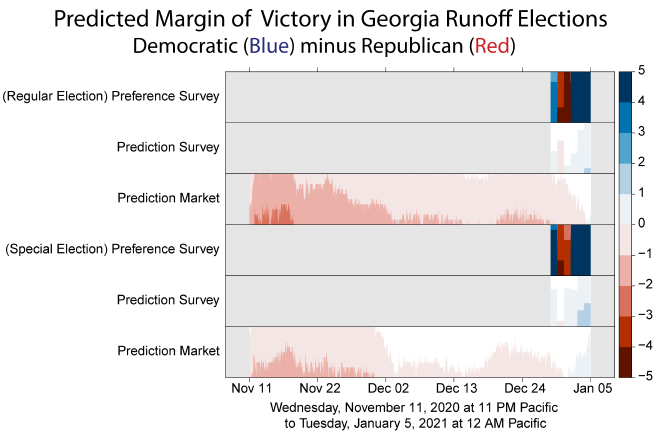Georgia Senatorial Runoff Elections in 2021
For the 2020 presidential election, we mistakenly predicted that Georgia would vote Republican. We returned to Georgia for the senatorial elections in January 2021. The regular senatorial election pitted Democratic challenger John Ossoff against Republican incumbent David Perdue. And the special senatorial runoff election pitted Democratic challenger Raphael Warnock against Republican incumbent Kelly Loeffler.
Concerned about what we perceived as a slight Republican bias in prediction markets, we developed prediction surveys, a new form of political survey.
In the last couple weeks leading up to the Georgia senatorial runoff elections, there had been considerable uncertainty about election outcomes. Across most of the observation period for prediction markets, margin-of-victory estimates suggested Republican wins. But opinion polls of likely voters in Georgia suggested close elections.
With the help of three sponsoring firms, including Isometric Solutions, we used preference and prediction surveys across the six days prior to the final day of in-person voting: December 30, 2020 through January 4, 2021.
We traced preference survey (opinion poll), prediction survey, and prediction market measures in the weeks leading up to the January election, as illustrated in this horizon chart for the two senatorial contests:

This is a six-panel political horizon chart for the Georgia runoff elections, three panels for the regular election and three for the special election. Panels share a common margin-of-victory scale from -5 for a strong Republican advantage to +5 for a strong Democratic advantage. The chart shows estimated margins of victory from preference surveys (political polls), prediction surveys, and prediction markets.
The Political Horizon Charts podcast on Spotify explains horizon charts with chance-of-winning percentage differences, which are similar in rendered colors to charts with margin-of-victory percentages, as shown in the above chart.
Results from the Georgia runoff elections showed that prediction surveys can provide more accurate election forecasts than both political polls (preference surveys) and prediction markets. Tom Miller’s election forecasting prowess gained recognition in Shawn Tully’s Fortune articles:
-
January 5, 2021, 5:36 AM PST Georgia runoffs: A data scientist, using a blend of poll and betting numbers, sees odds favoring the Dems.
-
January 5, 2021, 1:02 PM PST Georgia Senate races: Data scientist’s final prediction has Democrats taking both seats.
-
January 9, 2021 How a data scientist beat the polls by nailing the Georgia senate race.
Back to Methods.
Go to the home page of The Virtual Tout.